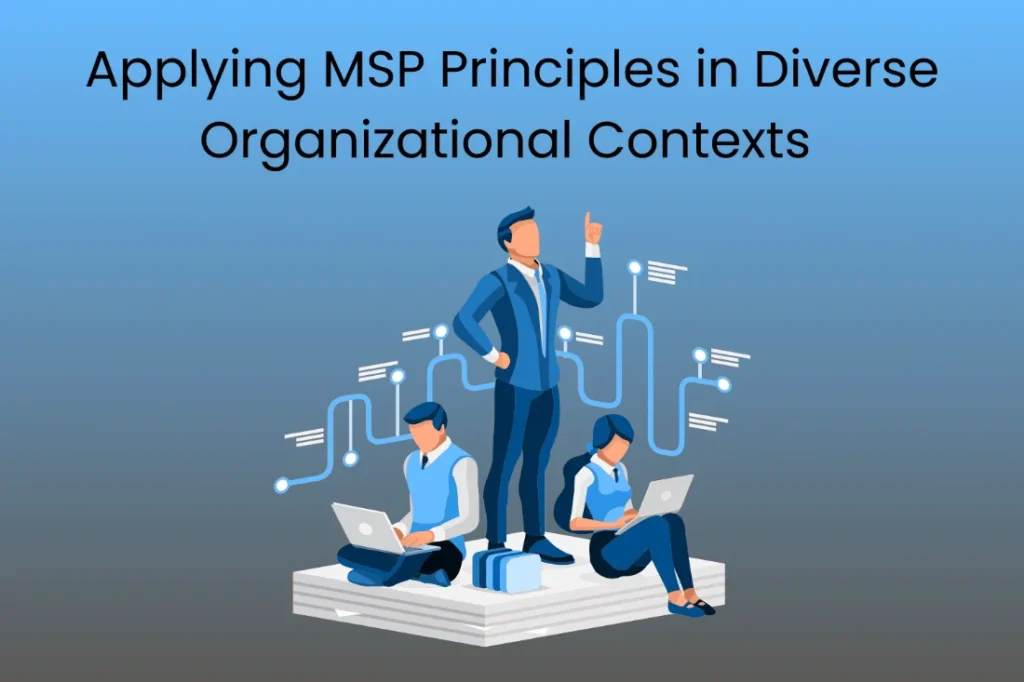
Managing Successful Programmes (MSP), a program management framework offering an organized method for planning and carrying out large-scale projects in an organization. If you’re looking to enhance your proficiency in program management, exploring MSP® Courses is essential for a comprehensive understanding of this robust framework. MSP has become a strong framework that offers an organized method of managing programs across industry lines. In this blog, we can analyze the importance of using MSP Principles in the various organizational contexts, identifying the critical elements that lead to Managing Successful Programs effective application.
Table of contents
- The Essence of MSP Principles
- Adapting MSP Principles to Diverse Organizational Contexts
- Conclusion
The Essence of MSP Principles
Fundamentally, MSP is not only a methodology, but also a strategic framework that helps organizations to manage and coordinate several projects within a programs to accomplish broad business objectives. The basic principles of MSP provide project managers and organizational leaders with a path to successfully navigate the complexities of programme management.
Visionary Programme Design
Creating a distinct programme vision is central to one of the core MSP tenets. This involves defining the goals, comprehending the strategic alignment, and creating a plan that directs the programme from start to finish. Success in a programme is facilitated by a clearly stated vision.
Leadership and Stakeholder Engagement
Effective leadership is a cornerstone of MSP principles. It encompasses the capacity to motivate and involve stakeholders at all levels and goes beyond official duties. MSP places a strong emphasis on the value of developing a cooperative atmosphere where all team members have a leadership role and are encouraged to take initiative and show dedication.
Benefit Management
The idea of benefits management is essential to MSP. This includes determining, clarifying, and achieving the program’s anticipated advantages. The concepts of MSP provide guidance to organizations in the methodical quantification and measurement of the value generated by their activities, guaranteeing that concrete advantages coincide with strategic goals.
Risk and Issue Management
Acknowledging the inherent uncertainty in any program, MSP places a significant emphasis on effective risk and issue management. Project managers are guided by these principles as they identify, evaluate, and mitigate risks, thereby promoting a proactive approach towards potential obstacles and uncertainties that may develop throughout the program’s lifecycle.
Adapting MSP Principles to Diverse Organizational Contexts
MSP’s adaptability to many organizational situations is what makes it strong. The concepts of management science provide a common framework for managing the difficulties of programme management, regardless of the setting—public sector, private businesses, or non-profit organizations.
Public Sector Excellence with MSP
MSP principles offer an organized method for coordinating projects with governmental goals in the public sector, where initiatives frequently involve a number of stakeholders and complex regulatory frameworks. This flexibility guarantees that public sector projects maintain compliance and successfully include stakeholders.
Private Enterprise Agility with MSP:
Adaptability and agility are key components of private enterprise success. The programme management method provided by MSP principles is both structured and flexible, enabling organizations to maximize commercial value, promote innovation, and match programmes with changing strategic objectives.
Non-Profit Sector Impact with MSP
Even in the non-profit sector, where success is measured by social impact rather than financial gain, MSP principles play a vital role. They offer non-profit organizations advice on how to manage stakeholder expectations, maximize beneficial outcomes with limited resources, and match programmes with their mission.
Overcoming Challenges through MSP Principles
Adopting MSP guidelines does not ensure a trouble-free trip. There could be challenges, such opposition from the organization or adjustments to the project’s parameters. However, MSP principles’ adaptability puts organizations in a position to successfully address these obstacles.
Organizational Change Management
MSP principles inherently recognize that programs often necessitate organizational change. This include modifications to procedures, frameworks, and occasionally even the culture of the company. An organization may effectively handle resistance, communicate, and cultivate an adaptable culture if it takes a proactive approach to change management.
Dynamic Scope Management
MSP principles offer an organized method for managing dynamic perspective when project scopes and priorities change. This entails ongoing evaluation and adjustment to changing demands in order to maintain programme alignment with corporate goals.
Conclusion
The successful implementation of MSP principles in various organizational contexts is not only a strategic decision but also essential for mastering complicated programme management. Because MSP principles are flexible, businesses can use a shared framework to customize their strategy to meet the particular possibilities and difficulties in their industry.
Understanding the specifics of MSP principles is a necessary step on the path to success in programme management. Organizations must adopt a proactive and flexible mentality, understanding that the principles are strategic directives that may be customized to fit the unique requirements of the company rather than inflexible laws.
